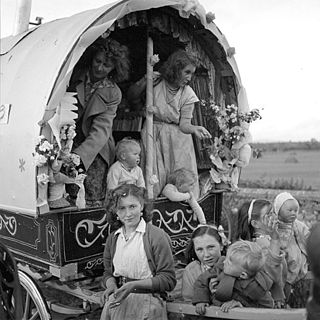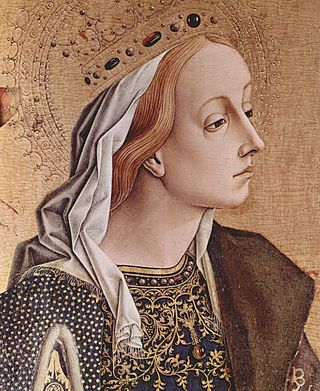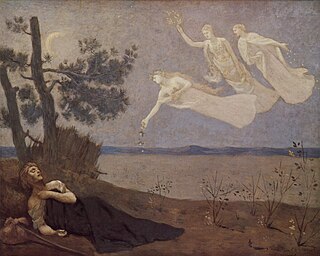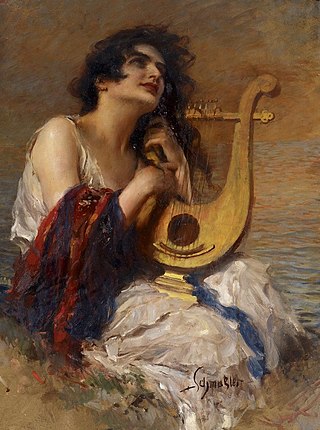 | |
| Pronunciation | FEE-ə |
|---|---|
| Gender | Female |
| Language(s) | Irish |
| Origin | |
| Meaning | deer, wild |
Fiadh is a given name for a woman. It is Irish in origin, coming from a word meaning "deer", [1] "wildness" but also "respect". [2] [3]
 | |
| Pronunciation | FEE-ə |
|---|---|
| Gender | Female |
| Language(s) | Irish |
| Origin | |
| Meaning | deer, wild |
Fiadh is a given name for a woman. It is Irish in origin, coming from a word meaning "deer", [1] "wildness" but also "respect". [2] [3]
Fiadh was largely unknown as a given name in the twentieth century, although the Irish word was known in the context of the fulacht fiadh and the word for a deer.
Irish given names for children experienced a spike in popularity after Vatican II when societal and parochial pressure to give saint's names to children was eased. Many of the Irish language origin names which were popular in the 1960s and 1970s (such as Sinéad, Deirdre or Emer) were out of fashion by the end of the century after reaching critical mass. Fiadh was part of a subsequent wave of names that became popular in the post Celtic Tiger period when the Irish language was perceived to have more social cachet. [4]
The name Fiadh first registered on the Republic of Ireland's CSO's name database in Tralee, Co.Kerry Ireland|1994]], with one incidence noted. Then again in 2002, Three incidents noted. This had multiplied tenfold by 2011 and the name entered the national top ten by 2018. In 2021 it was the first most popular feminine given name in Ireland. [5]
The CSO reported that "Fiadh" was the third highest ranked baby name for girls in 2022 with 320 registrations. A further 79 instances of "Fíadh" were registered. [6] Since 2018, the CSO has a policy of counting accented variations as separate names. [7] When taken together, the total number of registrations for "Fiadh" and "Fíadh" was 399, exceeding the total registrations of the most popular girls name in 2022, Emily, at 349.

The Republic of Ireland had a population of 5,149,139 at the 2022 census.

Fianna were small warrior-hunter bands in Gaelic Ireland during the Iron Age and early Middle Ages. A fian was made up of freeborn young males, often from the Gaelic nobility of Ireland, "who had left fosterage but had not yet inherited the property needed to settle down as full landowning members of the túath". For most of the year they lived in the wild, hunting, cattle raiding other Irish clans, training, and fighting as mercenaries. Scholars believe the fian was a rite of passage into manhood, and have linked fianna with similar young warrior bands in other early European cultures

Irish Travellers, also known as Pavees or Mincéirs, are a traditionally peripatetic indigenous ethno-cultural group originating in Ireland.

A given name is the part of a personal name that identifies a person, potentially with a middle name as well, and differentiates that person from the other members of a group who have a common surname. The term given name refers to a name usually bestowed at or close to the time of birth, usually by the parents of the newborn. A Christian name is the first name which is given at baptism, in Christian custom.
Matthew is an English language male given name. It ultimately derives from the Hebrew name "מַתִּתְיָהוּ" (Matityahu) which means "Gift of Yahweh".

Errigal is a 751-metre (2,464 ft) mountain near Gweedore in County Donegal, Ireland. It is the tallest peak of the Derryveagh Mountains and the tallest peak in County Donegal. Errigal is also the most southern and the highest of the mountain chain called the "Seven Sisters" by locals. The other peaks of the Seven Sisters are Muckish, Crocknalaragagh, Aghla Beg, Ardloughnabrackbaddy, Aghla More, and Mackoght.

Fulacht fiadh is the name given to one of many burned mounds, dating from the Bronze Age, found in Ireland. Most surviving examples consist of a low horseshoe-shaped mound of charcoal-enriched soil, and heat shattered stone, with a cooking pit located in a slight depression at its centre. In ploughed fields, they are apparent as black spreads of earth interspersed with small sharp stones.
A legal name is the name that identifies a person for legal, administrative and other official purposes. A person's legal birth name generally is the name of the person that was given for the purpose of registration of the birth and which then appears on a birth certificate, but may change subsequently. Most jurisdictions require the use of a legal name for all legal and administrative purposes, and some jurisdictions permit or require a name change to be recorded at marriage. The legal name may need to be used on various government issued documents. The term is also used when an individual changes their name, typically after reaching a certain legal age.
Caoimhe, pronounced Kweeva, sometimes anglicised as Kiva and pronounced as Keeva in Ulster, is an Irish feminine given name derived from Irish caomh "dear; noble". It means beautiful. It has been well-used in English-speaking countries and particularly in Ireland. from the same root as the masculine name Caoimhín (Kevin).

Katherine, also spelled Catherine and other variations, is a feminine given name. The name and its variants are popular in countries where large Christian populations exist, because of its associations with one of the earliest Christian saints, Catherine of Alexandria.

Watergrasshill is a village in north east County Cork in Ireland. Watergrasshill is within the Cork North-Central Dáil constituency. Bypassed in 2003, the village is situated on the R639 road and accessible via junction 17 of the M8 motorway. The 2016 census recorded a population of 1,346.
Ava is a feminine given name in English and in other languages. Its recent popularity may be linked to a number of celebrity babies of the 1990s, some of whom were ultimately named after American actress Ava Gardner (1922–1990).

Aisling is an Irish feminine given name meaning "dream" or "vision". It refers to an aisling, a poetic genre that developed in Irish poetry during the 17th and 18th centuries. There is no evidence that it was used as a given name before the 20th century. The name is included in Reverend Patrick Woulfe's 1923 collection of Irish names, with the comment that the name was in use in Derry and Omeath.
A Turkish name consists of an ad or an isim and a soyadı or soyisim (surname). Turkish names exist in a "full name" format. While there is only one soyadı (surname) in the full name there may be more than one ad. Married women may carry both their maiden and husband's surnames. The soyadı is written as the last element of the full name, after all given names.
Brandon is a masculine given name which originates from two or possibly three separate sources—two Celtic, the other Anglo-Saxon—and has historically been used by these different cultures independently. Today, most people with the name do not have any connection or lineage with any of these sources and use them as if they were the same name. In the instances of the Celtic origins, it is either a variant of the Irish masculine given name, Breandán, meaning "prince" or "king," or descended from the Old Welsh name Brân, meaning "crow" or "little raven". The Anglo-Saxon origin is the surname Brandon.
Brenda is a feminine given name in the English language.
Lasairfhíona, is an Irish language female given name. The name means "wine flame" or "flame of wine" as it derives from the Irish words lasair meaning "flame" and fhíona, the lenited genitive form of fíon meaning "wine". The "fh" combination is silent in Irish and spelling variations of this name also include Lasairíona.
Sean, also spelled Seán or Séan in Irish English, is a male given name of Irish origin. It comes from the Irish versions of the Biblical Hebrew name Yohanan, Seán and Séan, rendered John in English and Johannes/Johann/Johan in other Germanic languages. The Norman French Jehan is another version.

Lyra is a feminine given name of Greek and Latin origin meaning lyre. It is usually given in reference to the constellation and the Greek myth that inspired its naming. The name has associations with music and harmony and the night sky. The name has recently increased in usage due to a character in His Dark Materials, a book trilogy by Philip Pullman, and the television show and film adapted from the books.